

Superstars of Action
SUMMARY
A documentary about the career of Al Pacino. Hosted by Robert Wagner. Includes clips from his movies, interviews with Al and some of his co-workers. Twenty-five minutes long.
TEXT OF THE VIDEO
A big thanks to Janet Torres for transcribing this.
Super Stars of Action:
Al Pacino
Hosted by Robert Wagner
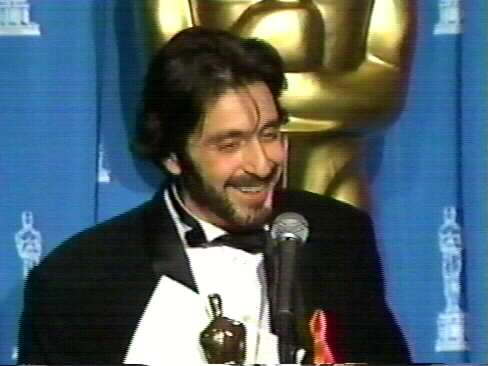 Narration: An
academy award winning actor whose intense, emotional style has brought life to a memorable
list of classic characters. Al Pacino on this episode of "Super Stars of Action".
Narration: An
academy award winning actor whose intense, emotional style has brought life to a memorable
list of classic characters. Al Pacino on this episode of "Super Stars of Action".
Wagner: Al Pacino is one of a select group of actors who made film history in the 1970's with emotional and fascinating performances and offbeat movies that changed Hollywood forever.
Pacino: The play is the thing, the play is first, the character is first in the work cuz that's very much the reason I'm here today is because of the characters I play and not because of my (sarcastic) scintillating personality.
Wagner: Al Pacino is the thinking man's antihero; tough, intense and complex, Pacino's characters possess a soft spoken demeanor that belies their explosive potential for violent action.
Pacino: Early on my career I guess I made few of those type films and it just sort of stayed, it caught. Some of them were successful so I think that, umm it ahhh... started a trend.
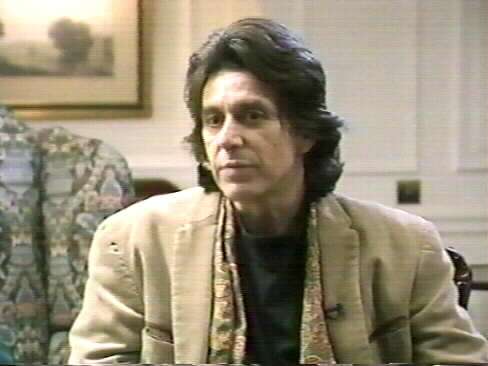 Wagner:
Alfredo Pacino was born in New York City in 1940 and set his sites on an acting career at
an early age. In 1966, Pacino was admitted in to Lee Strasberg's legendary Acting Studio.
Strasberg taught Pacino to fully inhabit his characters, Hollywood Reporter columnist, Robert Osborne:
Wagner:
Alfredo Pacino was born in New York City in 1940 and set his sites on an acting career at
an early age. In 1966, Pacino was admitted in to Lee Strasberg's legendary Acting Studio.
Strasberg taught Pacino to fully inhabit his characters, Hollywood Reporter columnist, Robert Osborne:
Robert Osborne: He's such a wonderful actor. I think it's been very wise of him to stay a New York actor, staying in New York and not ever become a part of the Hollywood scene because it's added kind of to a mystique and a mystery about him that I think the moviemakers like, and I think the public likes a lot.
Pacino: I took posture early on in my career that if we know too much about an actor that somehow it takes away from how we will accept the character they are playing. And this was an idea I had, and it was a significant idea to me. I don't really believe that as much anymore. Although I think there is a certain extent I think too much exposure... there's a tendency to become concerned with the personality rather than what the actor is doing.
Wagner: Pacino's big break came in 1969 when he starred in Panic in Needle Park. Pacino's harrowing depiction of a junkie's downward spiral is his first great film performance.
Pacino: I like all characters in drama because you know what they're gonna do, and you just.... you know... they know who they are and know where they've been and they know where they're going. So it is enjoyable to play people that are not like you.
Wagner: Pacino's success in Panic in Needle Park led to a role that would make him a Hollywood legend. For Pacino getting the role was a triumph itself. Francis Ford Coppola's was casting the role of Michael Corleone, Don Corleone's favorite son in the Godfather and the producers conducted a casting process unlike any seen in Hollywood since David Selznick's search for Scarlett O'Hara in Gone with the Wind. Godfather producer, Albert S. Ruddy:
Ruddy: Al Pacino, I was aware of his work, I had seen him work on Broadway. And I had seen Panic in Needle Park, which is another film he did then, he had completed before the Godfather. And... look it was fairly common knowledge at that point... I would like to think that I had discovered an unknown talent. But Al Pacino was acknowledged at that time as being one of the great young actors to be working in New York. Certainly an heir apparent to an actor the caliber of a Marlon Brando.
Pacino: It was Coppola right down the line who wanted me always for the part. When I myself didn't want to play it and when the producers didn't want me... and... Francis did. He... that's the way it is with directors, they have a vision and casting is a part of the vision.
Ruddy: I had to tell his agent David Beagleman it wasn't gonna work out we were having so much problems with trying to sell Al Pacino that I finally told David, I said David it's not going to work out. Because Al Pacino had an offer to do another movie called The Gang that Couldn't Shoot Straight. So I told David well go take it because it's not going to happen on the Godfather. So he went ahead and made the deal for Al on The Gang that Couldn't Shoot Straight. Then of course everything turned. Through constant erosion of wearing everybody down we finally convinced them that Al Pacino should do it. So we then had to sit down. David Beagleman had to extract Al Pacino from MGM. Paramount had to give up, I think a Herald Robbins novel that MGM wanted. Al Pacino does the Godfather and they then sign a real relative unknown to do The Gang that Couldn't Shoot Straight, Robert De Niro. So that's one of those funny stories.
Wagner: Pacino was brilliant in his tour-de-force portrayal as Michael Corleone.
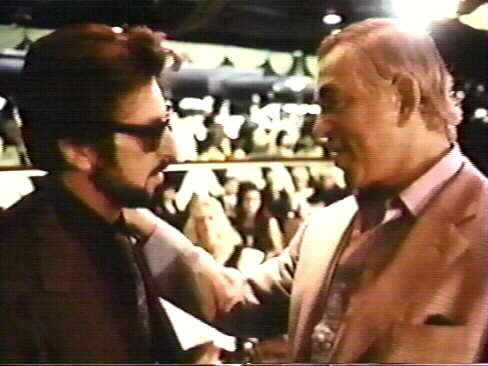 Al and Martin Bregman |
scene from Godfather
Pacino: I had no idea that that was the part for me. I thought - Sonny Corleone - that was the part which had the more... obviously the more demonstrative.... It was a meatier role, so to speak.
scene from Godfather
Pacino: It was really Michael's transitions from what he was to becoming... what he became. That was the sort of "juice" of the part and it took me a while to realize that.
Al Ruddy: We became very aware even before we started to shoot but certainly when we were shooting of the event that this movie was turning into.
Wagner: The Godfather earned nine academy awards nominations including Pacino's nomination as best supporting actor. Box Office history repeated itself with Godfather Part II. Again, Pacino received an academy award nomination this time for best actor and again he lost. Never before had a film and its sequel both won an academy award for best picture of the year and Pacino was an international star. Between Godfather films, Pacino turned in another classic performance in director Sidney Lumet's Serpico. Serpico was based on the life of Frank Serpico a New York cop who gained notoriety for exposing corruption within the New York Police Department. Pacino's long time friend and producer, Martin Bregman:
Bregman: I thought it would make a wonderful film and a wonderful vehicle for an actor that I had a close personal relationship with, Al Pacino, and that's how I got involved. I thought that Pacino would be magnificent in it and I developed it for him, with him in mind.
Pacino: I like to do real characters that really exist, because... like Frank Serpico was a real person I could look at him, and I had something that I could mold or sketch, or paint finally.
scene from Serpico
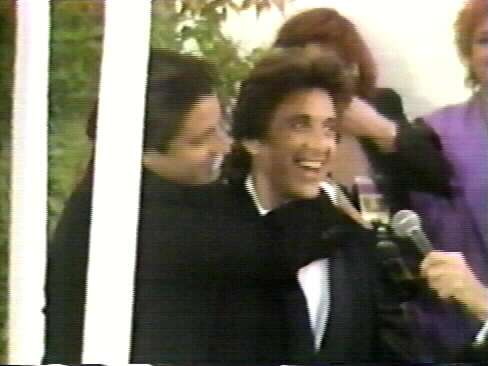 Al and Andy Garcia |
Wagner: Always fascinating, never predictable, Pacino helped establish the antihero as a Hollywood icon.
Wagner: By the mid 1970's, Al Pacino was at the top of his form. Nancy Griffin is the West Coast editor of Premiere Magazine:
Nancy Griffin: Al Pacino became a star in the 70's and that was the era of the antihero in American movies. In the 60's and 70's, roles like Jack Nicholson in Easy Rider and Al Pacino in Dog Day Afternoon, the Godfather movies as well. It was really the first time I think that ethnic actors became stars that was one of the distinguishing features about Pacino of course. I think Al is one of those guys who is um, one thinks of him as coming up from the street. He's rough around the edges, he is urban. But that's kind of cool, that street quality. He is very complex and very intense and I think he is very sexy.
Bregman: Pacino to me is the greatest American actor, in our industry today. I think he is just an extraordinary actor and also a leading man, which is unusual. There aren't that many leading men that are actors, that are artists. And I would classify Pacino as an artist.
Pacino: I don't think I can do anything, I don't think I'm right for anything, or can do anything. That's how I start. And that seems to have always been the case with me. That's why I sort of prefer seeing things. Uh, plays and things. And then I, when I see the part, someone acting in it, then I get a sense of what it is like looking at a model, if I were a painter.
Wagner: Pacino chalked up another best actor nomination for his performance as Sonny in Dog Day Afternoon.
scene from Dog Day Afternoon
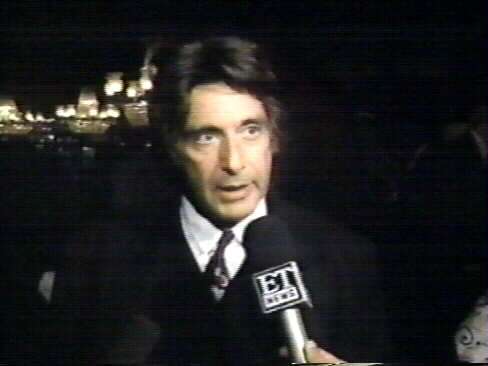 Bregman:
I thought that he could play this role better than anybody else in our business and I was
right. Al is a great actor I mean he's just a great actor. There's almost nothing he
cannot do.
Bregman:
I thought that he could play this role better than anybody else in our business and I was
right. Al is a great actor I mean he's just a great actor. There's almost nothing he
cannot do.
Wagner: Pacino's fifth academy award nomination recognized his fiery performance in the 1979 farce And Justice for All. In 1982 Pacino took on an uncharacteristic role in a light comedy, Author! Author! Produced by Irwin Winkler.
Irwin Winkler: I'd seen Al Pacino on Broadway and I'd seen him in other movies he's been in. You know he is a great actor. I think we probably made a great mistake with Revolution. I think it wasn't great for either of us. I thought he gave an interesting performance but, somewhere along the line the script didn't work and I thought it was a misconceived film. Whereas, Author! Author! he played a light comedy and he was wonderful. He is a wonderful; wonderful dedicated actor and a nice man.
Pacino: Some flops you have are like really quiet ones. And then there are others, there's expectation. The memory of that movie, the actual filming of it and the living through that time, and that period, 200 years ago, is about the most memorable movie I've ever made. Sometimes you are having a wonderful experience and the movie doesn't work.
Wagner: In 1983, Pacino brought a manic intensity to title role of Brian de Palma's contemporary remake of the classic Scarface.
Pacino: Scarface was a huge success. It's interesting this thing of how films are perceived. You can be in a movie and the perception is that it's a successful movie and it's not making it. But there's a certain amount of copy on it and it is perceived as a success. With Scarface it was such a controversial venture that it wasn't perceived as a successful movie, but it's indeed one of the most successful movies I've ever made, actually.
Wagner: Pacino spent much of the early 1980's performing on and off Broadway, winning rave reviews in playwright David Mamet's outstanding drama American Buffalo.
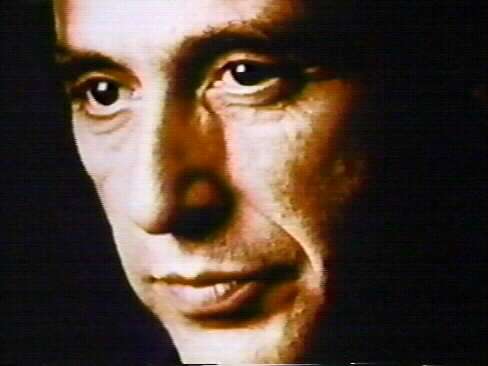 Pacino:
I was a stage actor, that's what I thought of myself as - someone who sort of knew what I
was doing there, and that that was where I belonged since that's where I started. And I
thought films were kind of a lucky thing that happened to me and I should just sort of get
on with it. And then go and do my plays because it was alien, all the wires and the
cameras. It is the wonderful thing about theater is that it gives you chance to play and
exercise your craft and do your thing without the world seeing you.
Pacino:
I was a stage actor, that's what I thought of myself as - someone who sort of knew what I
was doing there, and that that was where I belonged since that's where I started. And I
thought films were kind of a lucky thing that happened to me and I should just sort of get
on with it. And then go and do my plays because it was alien, all the wires and the
cameras. It is the wonderful thing about theater is that it gives you chance to play and
exercise your craft and do your thing without the world seeing you.
Wagner: Pacino took a self-imposed hiatus from filmmaking which lasted until his triumphant return four years later in the 1989 thriller Sea of Love.
Pacino: I felt what it was like to be broke, so I went back to work. It was too long between movies.
Bregman: Pacino did not do films in the four years that I read about because he chose not to do them. He was offered films, I assume he was. I mean he's a friend of mine and occasionally he would come to me with material that he would ask me to read and it just didn't work. It just wasn't good enough. He took a hiatus at this point but this was his doing. There was no comeback.
Wagner: Sea of Love producer, Martin Bregman, first got the screenplay from Pacino.
Pacino: He was a well
written character from New York cop close to my age and I think I was more believable in a
part like that. I was surprised by the kind of success it got, but I do think that it
wasn't as much as a risk as says Scarface was.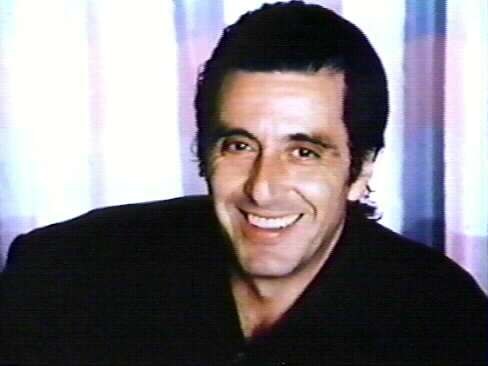
Wagner: Pacino began the 90's with a scene-stealing turn as the outlandish and hilarious Big Boy Caprice in the screen adaptation Dick Tracy. Pacino earned a fifth Oscar Nomination but once more left the awards empty handed. Pacino returned to his most famous role in the Godfather Part III. In keeping with the times, Pacino created a kinder gentler but no less complex Michael Corleone.
Gray Fredrickson: When you
look at the three, you get away from it for awhile and look at it as a trilogy. And look
at all three
Godfathers. I
think they flow together beautifully. And I think that Pacino just fit... carried right on
from the character that you saw sitting in Tahoe there contemplating. He went on in to
late... mid life, a perfect transition.
Wagner: In 1992, Pacino chalked up not one, but two academy awards nominations. Nomination number six was for his mesmerizing supporting role in David Mamet's award winning Glengarry Glen Ross.
Pacino: I was offered the play actually first in New York City, David Mamet offered me the part. Getting the opportunity to play roles like that that you don't usually get... on sc..... And then this movie idea came to someone. And I believe Jerry Tokofsky the producer offered me the movie.
scene from Glengarry Glen Ross
Pacino: We worked it together like it was a play and then we shot it like a play, in order.
scene from Glengarry Glen Ross
Pacino: Doing something like that on the screen is what got us all together, and getting the opportunity to play roles like that, that you don't usually get... movies parts don't usually have that kind of syntax in the dialogue, that kind of depth…
Wager: Pacino also earned a best actor nomination for his portrayal of the blind, bombastic and embittered lieutenant Frank Slade in Scent of a Woman. Pacino breathed fiery life into every scene in the film giving one of the strongest performances of his career.
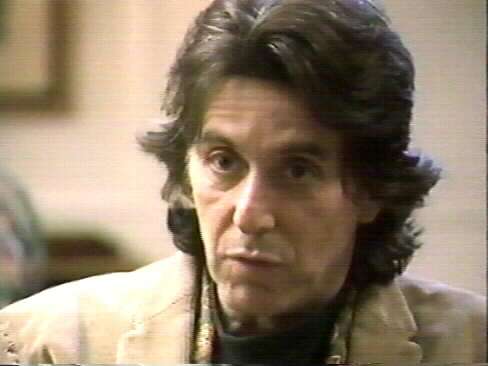 Pacino: I
remember I had to speak during the filming of Scent of a Woman
to a group of young, aspiring actors in a high school and I remember for the first fifteen
minutes speaking and not… I didn't focus. I didn't see them. I was talking to a mass
like that because I was in it. So you really take it into your daily life and stuff. Then
finally you start to shed it layer by layer until hopefully you can do it on cue.
Pacino: I
remember I had to speak during the filming of Scent of a Woman
to a group of young, aspiring actors in a high school and I remember for the first fifteen
minutes speaking and not… I didn't focus. I didn't see them. I was talking to a mass
like that because I was in it. So you really take it into your daily life and stuff. Then
finally you start to shed it layer by layer until hopefully you can do it on cue.
Wagner: Seven proved the charm for Pacino as he finally won the coveted best actor Oscar for Scent of a Woman.
Pacino: So I have been in movies for like over twenty years, twenty-five years, close to it, and you sort of learn to swim in different tides and survive through things, and find your way through things if you do indeed survive, but perhaps it will mean something different in my life I don't know, maybe retirement (laughs).
Robert Osborne: I think that one thing about Gary Cooper that was so great which is the same thing about Al Pacino was the fact that sophisticates loved Cooper, and they love Pacino and working men love Al Pacino and street kids love Al Pacino and Harvard graduates love Al Pacino.
Gray Fredrickson: I think Pacino is one of the greatest actors in America today. I thought Scent of a Woman, it was incredible what he did. And you look at this body of work the different characters: Dog Day Afternoon, and Godfather and those different roles… he's amazing. Some people have it and some don't…. and I don't know if they... I don't know how he has to work to get to that point or if it is just is something like a great athlete has where it just comes easy for the guy, I mean he's so good.
Pacino: I got an award in Junior High School for the most likely to succeed actually. PS 98th South Bronx. That's right, most likely to succeed, is great! But I did want to win the handsomest guy in school of course.
Wagner: In 1993, Pacino reunited with director Brian de Palma and longtime colleague producer Martin Bregman. The result was Carlito's Way.
Bregman: Carlito is a great film. Same cast of characters, but it's Pacino, De Palma and Bregman. It's a wild film.
Pacino: One's lifestyle, especially this kind of a thing I do which is movies which takes me all over the world which is plays, and movies and characters and concepts… all kinds of different explorations into the psyche of different people. These are adventures for me.
Wagner: With each role Pacino rises to new challenges and turn in exciting, unique and memorable performances.
scene from Glengarry Glen Ross
Pacino: A favorite saying of mine, "Man's reach should exceed his grasp or what's a heaven for?"
Wagner: Al Pacino brings to the screen intense characters that vibrate with life and complex humanity. Loved by fans, admired by critics, honored by his peers, Al Pacino is one of the finest actors Hollywood has ever known.
Until next time, see you at the movies.
(270k) It was Coppola right down the line who wanted me always for the part. When I myself didn't want to play it and when the producers didn't want me... and... Francis did. He... that's the way it is with directors, they have a vision and casting is a part of the vision.
(67k) "Man's reach should exceed his grasp or what's a heaven for?"
(565k) I remember I had to speak during the filming of Scent of a Woman to a group of young, aspiring actors in a high school and I remember for the first fifteen minutes speaking and not… I didn't focus. I didn't see them. I was talking to a mass like that because I was in it. So you really take it into your daily life and stuff. Then finally you start to shed it layer by layer until hopefully you can do it on cue.
DVD INFO
Currently unavailable in dvd or vhs.
|
|
Internet Movie Database |